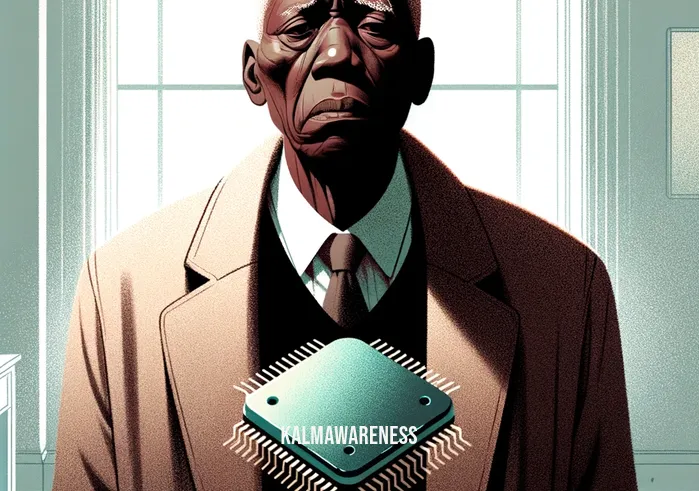The Hidden Power in a Chip on Your Shoulder
Have you ever met someone who seems constantly driven by an invisible force, as if they’re proving something to the world? That’s what it’s like to have a “chip on your shoulder.” This phrase often carries a negative connotation, but is it really all that bad? Let’s dive into the heart of this question: is it good to have a chip on your shoulder?
Embracing the Chip: A Source of Motivation
At its core, having a chip on your shoulder means you’re motivated by personal grievances or perceived slights. It’s like carrying a tiny, persistent voice that whispers, “I’ll show them.” This can be a powerful motivator. For many, it’s a push towards excellence, a desire to prove doubters wrong. The story of an underdog reaching his dream despite all odds is a classic example of using that chip as a fuel for success.
The Fine Line Between Drive and Obsession
However, there’s a thin line between healthy motivation and obsession. A chip on your shoulder can propel you forward, but it can also consume you. It’s important to recognize when this drive is becoming detrimental to your well-being. This realization is akin to understanding the meaning of being fiercely driven, yet maintaining balance in life.
The Psychology Behind the Chip
Psychologically speaking, a chip on your shoulder can be linked to a deep-seated need for validation. This need often stems from past experiences of being undervalued or overlooked. The burning desire to prove oneself can lead to significant personal growth and achievement. Inspirational quotes about personal growth often highlight the transformative power of overcoming personal challenges.
The Flip Side: Potential Pitfalls
While this drive can lead to success, it can also result in constant dissatisfaction. If your sole motivation is proving others wrong, you might miss out on the joy of the journey itself. It’s essential to ponder on why you’re doing what you’re doing. Is it for yourself, or to spite others?
Cultivating Self-Awareness: The Key to Balance
The most crucial aspect of having a chip on your shoulder is self-awareness. Recognizing why you feel this way and how it affects your decisions is vital. This self-awareness can be nurtured through practices like mindfulness, which help you understand and manage your emotions effectively.
Turning the Chip into Positive Action
Instead of letting this chip control you, you can control it. Use it as a catalyst for self-improvement and personal growth, rather than a source of bitterness. This means transforming that energy into positive action, focusing on what you can do rather than what others have done to you.
Conclusion: A Balancing Act
So, is it good to have a chip on your shoulder? It’s a balancing act. Used wisely, it can be a powerful motivator. But left unchecked, it can lead to an unhealthy obsession. The key lies in harnessing this drive in a positive, self-aware manner.
As you reflect on this, consider the following question: How can you transform a personal grievance into a source of positive, sustainable motivation? Stay tuned for the next part of this essay, where we’ll explore strategies to turn the chip on your shoulder into a stepping stone for personal success.

Harnessing the Chip: Channeling Your Inner Drive
Transitioning from understanding the nature of having a chip on your shoulder, let’s delve deeper into how to effectively harness this feeling. It’s about turning a potentially negative emotion into a catalyst for positive change and growth.
The Art of Channeling Emotions
Turning Negativity into a Positive Force
The key to leveraging the chip on your shoulder lies in transforming negative emotions into positive actions. This process is similar to alchemy, where base metals are turned into gold. It’s about taking feelings of resentment or inadequacy and converting them into a driving force towards personal and professional achievements.
Example in Action
Consider a scenario where someone is overlooked for a promotion. Instead of harboring resentment, they use this as motivation to improve their skills and prove their worth. This mindset shift is crucial – it’s not about the setback, it’s about the comeback.
Balancing Act: Healthy Motivation vs. Toxic Resentment
Striking the Right Balance
Having a chip on your shoulder can be a double-edged sword. It’s essential to strike a balance between using it as motivation and not letting it turn into toxic resentment. This balance is critical for mental health and overall well-being.
| Emotion | Healthy Expression | Unhealthy Expression |
|---|---|---|
| Resentment | Fuel for self-improvement | Bitterness and hostility |
| Inadequacy | Drive to learn and grow | Constant self-doubt |
| Anger | Catalyst for change | Destructive behavior |
Recognizing and Redirecting Unhealthy Patterns
It’s important to recognize when these emotions are leading you down a negative path. Practices like mindfulness, which can be explored through resources like mindfulness counseling, can help in identifying and redirecting these patterns.
The Role of Self-Reflection in Managing the Chip
Reflecting on the Why
Understanding why you have a chip on your shoulder is a vital step in managing it effectively. Is it a response to a specific incident, or is it tied to a deeper issue of self-worth? Reflecting on these questions helps in addressing the root cause rather than just the symptoms.
Insights through Personal Growth
Exploring personal growth literature, like quotes on personal growth, can provide valuable insights and strategies for turning this chip into a positive force in your life.
Navigating the Path Forward
Setting Boundaries
It’s crucial to set boundaries for how much of this chip you allow into your professional and personal life. It should serve as a motivator, not as a constant source of stress or anger.
Embracing Growth, Not Grudges
The ultimate goal is to embrace growth and learning, not to hold onto grudges. This mindset shift is what separates those who use their chip constructively from those who are consumed by it.
Conclusion: A Tool for Transformation
In conclusion, having a chip on your shoulder can be a powerful tool for personal and professional growth if managed correctly. It’s about channeling emotions in a way that propels you forward, rather than holding you back. The art of using this chip effectively is a delicate balance, one that requires self-awareness, reflection, and the ability to transform challenges into opportunities for growth.
As we wrap up this section, consider this: How can you differentiate between using your chip as a constructive force and letting it become a destructive one? The final part of our essay will explore practical strategies for maintaining this balance, ensuring that the chip on your shoulder becomes a stepping stone rather than a stumbling block.

Crafting Your Chip: The Path to Positive Transformation
In this final part of our exploration into the complexities of having a chip on your shoulder, we’ll synthesize our insights and offer actionable perspectives. It’s time to transform this common human experience into a force for personal growth and success.
The Power of Perspective in Managing Your Chip
Reframing Challenges as Opportunities
A significant step in using the chip on your shoulder positively is to reframe challenges as opportunities for growth. This perspective shift can turn feelings of resentment into a quest for self-improvement and excellence.
Example: Overcoming Adversity
Imagine facing a setback at work. Instead of stewing in frustration, view it as a chance to hone your skills. This approach not only elevates your professional capabilities but also enriches your personal growth journey.
Integrating the Chip into Your Growth Strategy
Making Conscious Choices
Being mindful of how and why you use the chip on your shoulder is crucial. It involves making conscious choices about your reactions and actions, ensuring they align with your long-term goals and values.
Leveraging Self-Awareness
Enhancing self-awareness helps in understanding the triggers and impacts of your chip. Techniques like guided meditation for abundance can aid in developing this crucial skill, offering a pathway to balance and harmony.
Future Applications: Evolving with Your Chip
In Professional Settings
| Challenge | Application of the Chip | Positive Outcome |
|---|---|---|
| Tough Feedback | Use as motivation to improve | Enhanced skills and resilience |
| Competitive Environment | Drive to innovate and excel | Career advancement and fulfillment |
In Personal Growth
Continual learning and self-improvement, influenced by the chip, can lead to a richer, more fulfilling life. It’s about evolving with your experiences, not being defined or limited by them.
Encouraging Ongoing Learning and Exploration
Broadening Horizons
I encourage you to further explore this topic through additional resources. Delve into books or articles that discuss emotional intelligence, resilience, and personal growth. The journey of learning is endless and always rewarding.
Conclusion: Embracing the Chip as a Catalyst
Having a chip on your shoulder, when managed wisely, can be a powerful motivator and catalyst for positive change. It’s about harnessing this energy for self-improvement, personal growth, and professional success. Let’s summarize the key takeaways:
- Understanding the Chip: Recognizing the emotional underpinnings of having a chip on your shoulder.
- Channeling the Energy: Transforming negative emotions into positive actions and motivations.
- Maintaining Balance: Striking a healthy balance between motivation and obsession.
- Future Applications: Leveraging this drive in both personal and professional realms for continuous growth and success.
- Ongoing Learning: Engaging in continuous self-improvement and exploration.
As we conclude, reflect on how you can turn your chip into a source of strength and inspiration. How will you use it to fuel your journey towards success and personal fulfillment?





